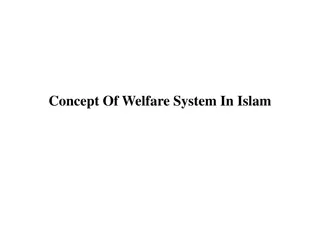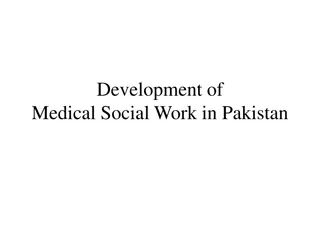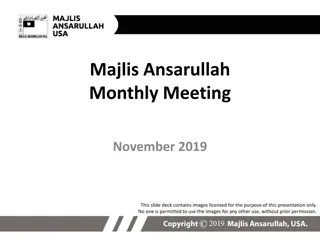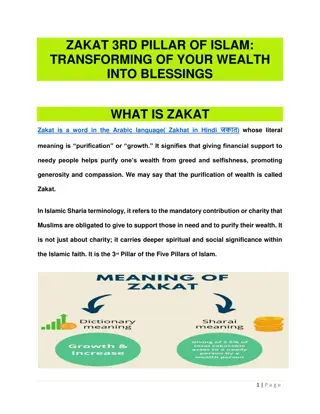Maqasid al-Shariah-Based Performance Evaluation Index for Islamic Social Finance Institutions
This study focuses on developing a performance evaluation index for Islamic social finance institutions (ISFIs) based on Maqasid al-Shariah to better measure their performance beyond just financial aspects. The aim is to analyze how far ISFIs have accomplished Maqasid during their operations through
1 views • 22 slides
Welfare System in Islam: Principles and Social Responsibility
Islam emphasizes serving humanity alongside worshipping Allah. It introduced the concept of a welfare state where social justice, mercy, and support for vulnerable groups are integral. The teachings advocate charity, mutual responsibility within families, and societal welfare through acts like Zakat
0 views • 12 slides
Development of Medical Social Work in Pakistan: A Historical Overview
In 1953, Miss Anna Mo Toll, a Swedish medical social worker, introduced medical social work in Pakistan, initially met with confusion and skepticism. Over time, medical social work units have been established across provinces to address the basic needs of patients, such as access to medicines, rehab
1 views • 6 slides
Transforming Islamic Co-Operative Model into Ethical Fintech Solution
Indonesian farmer Ziyaad Mahomed's case study highlights challenges in livestock farming, rice plantations, and more due to theft, capital, and manpower issues. Market survey suggests microfinance, co-operative restructuring, waqf, and zakat solutions with emphasis on risk-sharing over debt-based Is
0 views • 12 slides
Understanding Zakat in Islam
Zakat is a fundamental pillar of Islam aimed at increasing, cleansing, and purifying wealth and the soul. It is distinct from charity (Chanda) and is mandatory for those who possess wealth above the assessable limit (Nissab). Zakat is not a tax on income but a percentage (2.5%) paid on savings, cash
0 views • 23 slides
Exploring Zakat, Khums, and Ethical Giving in Islam
Delve into the concepts of zakat and khums in Islam, examining the ethical value of obligatory giving and wealth purification. Compare these practices with modern humanitarian charity models, questioning the role of compulsory giving and its impact on community support. Explore the historical contex
0 views • 4 slides
ZAKAT 3RD PILLAR OF ISLAM: TRANSFORMING OF YOUR WEALTH INTO BLESSINGS
\/\/seribangash.com\/\nis a word in the Arabic language( Zakhat in Hindi \u091c\u0915\u093e\u0924) whose literal meaning is \u201cpurification\u201d or \u201cgrowth.\u201d It signifies that giving financial support to needy people helps purify one\u2
0 views • 19 slides






